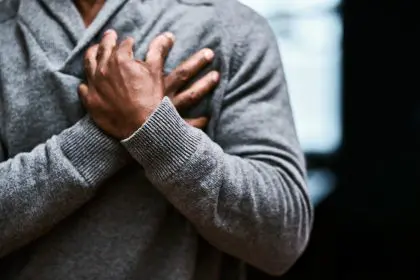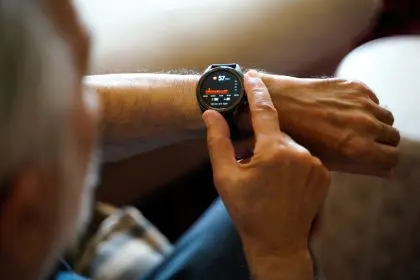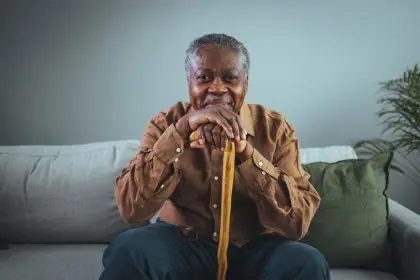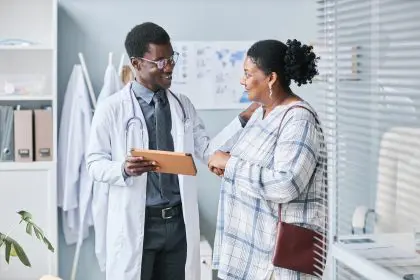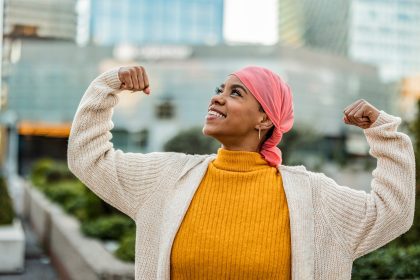Rhonda Smith, a 16-year breast cancer survivor and Executive Director of the California Black Health Network, has dedicated her career to advancing health equity for Black Californians. With an MBA from the University of Virginia and a background in civil engineering, Smith has led numerous health disparities initiatives for BIPOC communities. Her experience includes roles as Project Director for the LiveHealthy OC Initiative and Statewide Project Manager for the Susan G. Komen® Circle of Promise California Initiative. In this interview, Smith shares her personal journey with breast cancer and offers insights on empowering patients to navigate the health care system.
[Editor’s note: This is a truncated transcribe of a longer video interview. Please see the video for the extended version. Some errors may occur.]
How have you found the journey for those who are listening in your interaction with and around breast cancer in particular today?
I am a 16-year breast cancer survivor. My breast cancer experience led me to do this work. I was living in Miami at the time and went through breast cancer treatment the second half of 2008. I wanted to do more work in breast cancer and health disparities. It was through a research project at the Cancer Center that I was treated at that I was first introduced to health disparities. Initially I was pissed off about it and then became passionate about it. It led me to actually leave Miami and come to California and began to do work here in health disparities and really make that my life’s purpose.
As it relates to work that I’ve done in the breast cancer space, it was really important for me to take what I learned from my breast cancer journey and the resources that I had available to me and share that information with other women to help them understand how to go through their journey in the best way possible to ensure that they were able to maintain their health and well-being. I started an organization when I was still in Miami called Breast Cancer Partner to really support women through their journey, to help them understand how to recover from treatment when they were done, how to restore their lives back to normal and how to get re-energized and live in their lives well beyond breast cancer.
Survivorship, as they call it, traditionally had been at the time the starting point from when you’re done with treatment. But I view survivorship from the moment that you’re diagnosed because we’re not just trying to survive, we’re trying to thrive also. A lot of times people just don’t know what they don’t know. So, I try to bring that information to our community through the work that I do here at the California Black Health Network.
If you were a breast cancer whisperer and she got her first notice via phone, via sitting in a doctor’s office, and she gets to meet fear. Share two to three ways that you immediately deal with the fear of hearing a diagnosis that you have breast cancer?
First of all, it’s important to know that you don’t have to go through this alone and you should not. Whether it’s whoever you call family, if it’s your relatives or the family that you chose, I think it’s important to make sure that we take them along in our journey because having support and love and having others to advocate for you is also very important. I think it’s also important to ask questions so that even if you hear the words, you have breast cancer, it’s important to know what stage that is, what type of breast cancer you have, and also what your prognosis is. Yes, it’s scary, but it could be a stage one, two, three, or four. So, it’s important to know that information so that you know exactly what it is that you’re up against and they can put together a plan to really make sure that you come out of this process with the best outcome possible.
You can rely on your faith. There’s also, wherever you get treated, generally there are resources if you need a therapist or a counselor of some sort, or if you prefer to go to your pastor or some elder in the church who is that kind of support. I think it’s important to make sure that you have that connection and resource to actually talk to somebody and make sure that you’re emotionally as well as mentally and spiritually well and whole and have that kind of support. Because it’s not just about the physical aspect of being diagnosed and going through treatment. You really have to think about the whole person—that’s the physical, mental, emotional, as well as spiritual aspects of your journey and well-being. So, making sure that you focus on all those dimensions is really important.
When you think about diet and all the things related to what you’re going to put in your body, how have you pivoted or provided new ingredients for your temple, new ingredients for your body, new ingredients for your soul?
I was very fortunate to be able to work with an integrative nutritionist when I was diagnosed because I wanted to do whatever I could within my power and control to make sure I didn’t feel like a cancer patient and to stay healthy throughout that process. And so, my nutritionist really helped me change, eliminate some of the bad things that I was eating. I was always physically active, but I didn’t really understand about how food can be medicine as well as I did or learned when I was going through my breast cancer journey.
She helped me really understand how to eat the right foods and also how to eat the right foods the day before my chemotherapy, the days after chemotherapy, and what I could do on an ongoing basis to help keep my immune system up and to make sure that I was choosing the right things to put into my body. I continue to practice that or adopt that because I wanted to have energy. I wanted to stay healthy. And so, eliminating, I say if you can eliminate anything in a bag, box, jar, or can from your diet, that is one step in the right direction and making sure that we eat whole foods. And I say whole foods is a way to eat, not necessarily a place where you go shopping for food. And that means eating food more so in its natural state as opposed to it being processed. If you don’t have access to healthy fresh produce, frozen is the next best option. But I would shy away from anything that’s really processed because that could lead to a host of other issues.
When you think about the very aspect of exercise, sleep, meditation, the things that will allow us to calm ourselves, what tools have you used since you have been diagnosed?
Yoga—my yoga practice was very instrumental in doing all those things. And I say, yoga to me is not necessarily another form of exercise, but it really enabled me to understand the whole mind, body, spirit connection. And it was a particular type of yoga that I practiced while I was going through my breast cancer journey. And so, I really was able to calm my mind and calm my spirit and be more centered in my life and being able to make more conscious choices and being intentional about what I needed to do to take care of me first and my health and well-being.
Especially after I finished treatment, I thought that my last day of radiation, I could pick up my life where I left off before I got diagnosed, but I realized I was a different person. And doctors don’t talk to you about very much about the after-effects of chemotherapy and cancer treatment. And it affects everybody in different ways. And so, I was not prepared for all of that, but I was able to access the right tools and resources. I continued my yoga practice. I actually had an issue from my surgery, and I went to an acupuncturist to deal with that issue.
I continued even throughout my treatment—I walked about three miles every day because it’s important. I remember the day that I said, I’m not going to go out for a walk. Halfway through the afternoon, I felt really lethargic and just crappy. And I was trying to figure out, well, what’s the difference between today and yesterday? And I realized that I didn’t walk that morning. So, it really makes a big difference. And there’s research to prove that being physically active during cancer therapy really helps to improve outcomes and maintain your energy level as best as possible. I didn’t lift weights or do heavy things like that, but I was able to do yoga and actually walk and get some cardio in. And that made all the difference in the world for me.


